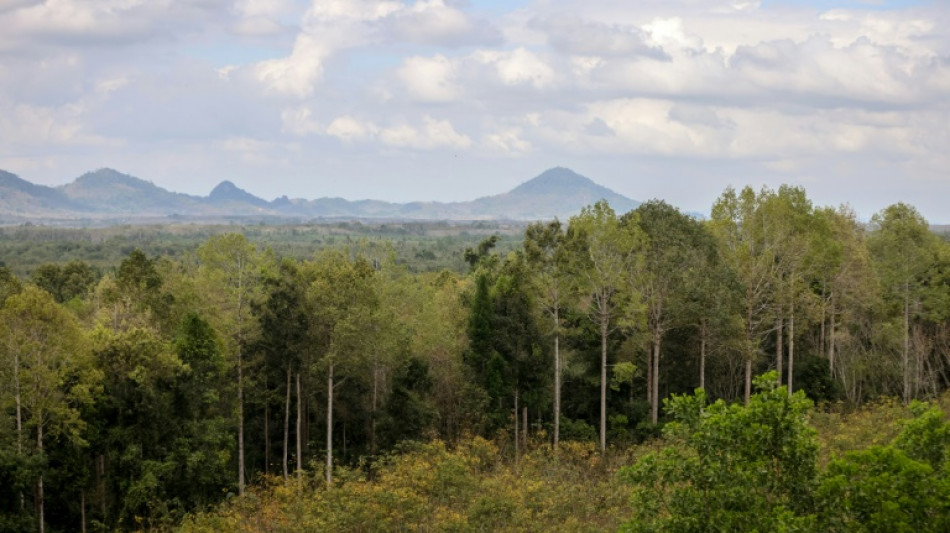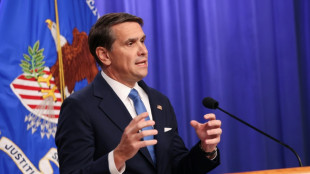
-
 Blanc wins final women's race before Winter Olympics
Blanc wins final women's race before Winter Olympics
-
Elena Rybakina: Kazakhstan's Moscow-born Melbourne champion

-
 Ice-cool Rybakina beats Sabalenka in tense Australian Open final
Ice-cool Rybakina beats Sabalenka in tense Australian Open final
-
Pakistan attacks kill 15, dozens of militants dead: official

-
 Ten security officials, 37 militants killed in SW Pakistan attacks: official
Ten security officials, 37 militants killed in SW Pakistan attacks: official
-
Epstein survivors say abusers 'remain hidden' after latest files release

-
 'Full respect' for Djokovic but Nadal tips Alcaraz for Melbourne title
'Full respect' for Djokovic but Nadal tips Alcaraz for Melbourne title
-
Wollaston goes back-to-back in the Cadel Evans road race

-
 Women in ties return as feminism faces pushback
Women in ties return as feminism faces pushback
-
Ship ahoy! Prague's homeless find safe haven on river boat

-
 Britain's Starmer ends China trip aimed at reset despite Trump warning
Britain's Starmer ends China trip aimed at reset despite Trump warning
-
Carlos Alcaraz: rare tennis talent with shades of Federer

-
 Novak Djokovic: divisive tennis great on brink of history
Novak Djokovic: divisive tennis great on brink of history
-
History beckons for Djokovic and Alcaraz in Australian Open final

-
 Harrison, Skupski win Australian Open men's doubles title
Harrison, Skupski win Australian Open men's doubles title
-
Epstein offered ex-prince Andrew meeting with Russian woman: files

-
 Jokic scores 31 to propel Nuggets over Clippers in injury return
Jokic scores 31 to propel Nuggets over Clippers in injury return
-
Montreal studio rises from dark basement office to 'Stranger Things'

-
 US government shuts down but quick resolution expected
US government shuts down but quick resolution expected
-
Mertens and Zhang win Australian Open women's doubles title

-
 Venezuelan interim president announces mass amnesty push
Venezuelan interim president announces mass amnesty push
-
China factory activity loses steam in January

-
 Melania Trump's atypical, divisive doc opens in theatres
Melania Trump's atypical, divisive doc opens in theatres
-
Bad Bunny set for historic one-two punch at Grammys, Super Bowl

-
 Five things to watch for on Grammys night Sunday
Five things to watch for on Grammys night Sunday
-
Venezuelan interim president proposes mass amnesty law

-
 Rose stretches lead at Torrey Pines as Koepka makes cut
Rose stretches lead at Torrey Pines as Koepka makes cut
-
Online foes Trump, Petro set for White House face-to-face

-
 Seattle Seahawks deny plans for post-Super Bowl sale
Seattle Seahawks deny plans for post-Super Bowl sale
-
US Senate passes deal expected to shorten shutdown

-
 'Misrepresent reality': AI-altered shooting image surfaces in US Senate
'Misrepresent reality': AI-altered shooting image surfaces in US Senate
-
Thousands rally in Minneapolis as immigration anger boils

-
 US judge blocks death penalty for alleged health CEO killer Mangione
US judge blocks death penalty for alleged health CEO killer Mangione
-
Lens win to reclaim top spot in Ligue 1 from PSG

-
 Gold, silver prices tumble as investors soothed by Trump Fed pick
Gold, silver prices tumble as investors soothed by Trump Fed pick
-
Ko, Woad share lead at LPGA season opener

-
 US Senate votes on funding deal - but shutdown still imminent
US Senate votes on funding deal - but shutdown still imminent
-
US charges prominent journalist after Minneapolis protest coverage

-
 Trump expects Iran to seek deal to avoid US strikes
Trump expects Iran to seek deal to avoid US strikes
-
Guterres warns UN risks 'imminent financial collapse'

-
 NASA delays Moon mission over frigid weather
NASA delays Moon mission over frigid weather
-
First competitors settle into Milan's Olympic village

-
 Fela Kuti: first African to get Grammys Lifetime Achievement Award
Fela Kuti: first African to get Grammys Lifetime Achievement Award
-
'Schitt's Creek' star Catherine O'Hara dead at 71

-
 Curran hat-trick seals 11 run DLS win for England over Sri Lanka
Curran hat-trick seals 11 run DLS win for England over Sri Lanka
-
Cubans queue for fuel as Trump issues energy ultimatum

-
 France rescues over 6,000 UK-bound Channel migrants in 2025
France rescues over 6,000 UK-bound Channel migrants in 2025
-
Surprise appointment Riera named Frankfurt coach

-
 Maersk to take over Panama Canal port operations from HK firm
Maersk to take over Panama Canal port operations from HK firm
-
US arrests prominent journalist after Minneapolis protest coverage


Carbon credits: a contested tool to fight deforestation
Planting trees or safeguarding tropical rainforests have become popular tools for companies seeking to offset their carbon emissions and proclaim their commitment to the environment.
However, recent scandals have cast a shadow over the carbon credit industry, revealing a landscape rife with opportunities for greenwashing.
Walt Disney, JP Morgan Bank and other major corporations have been accused of purchasing carbon credits from forest protection projects in areas that were not actually at risk of deforestation.
Separately, a company responsible for managing 600,000 hectares of land in the United States has reportedly earned $53 million over the past two years from carbon credits that did not significantly alter its forest management practices.
None of these projects sequestered carbon beyond that which would have been absorbed by trees through photosynthesis in a business-as-usual scenario.
Still, companies counted the resulting carbon credits towards their own reduction targets, allowing them to offset emissions in the carbon accounting of their operations.
Leaders and experts from around the world will gather in the Gabonese capital Libreville on March 1 and 2 for the One Forest Summit.
Co-presided by France and Gabon, the meeting will focus on improving financial instruments aimed at protecting the world's forests.
Carbon credits are already widely used. According to various estimates, the number of tons of CO2 they represent (with one credit equivalent to one ton) could increase tenfold by 2030, to around two billion tons.
"The risky aspect of the carbon credit market is that it is not self-regulating," said Cesar Dugast from French environmental consultancy Carbone 4, in an interview with AFP.
"Everyone has an interest in maximising the quantity of carbon credits. It enables the project developers to spread the total cost over a maximum number of credits, offering a lower cost to buyers.
"Even the certifiers have an interest in the proliferation of projects," he added.
In mid-January, The Guardian, Die Zeit and an NGO revealed that more than 90 percent of projects certified by leading verifier Verra for forest conservation under the UN programme to reduce deforestation and forest degradation (REDD+) were likely "ghost credits" that did not represent "real emissions reductions".
Verra's CEO, David Antonioli, rejected these findings, arguing that "REDD projects are not some abstract concept on a piece of paper; they represent real projects on the ground that deliver life-affirming benefits."
- Carbon credits under debate -
After the story came out, the price of nature-related carbon credits has dropped, according to Paula VanLaningham, global head of carbon at S&P Global.
The revelations about REDD+ projects have sparked a wider debate about the entire carbon credit system.
"Are the projects themselves a good vehicle for carbon finance in a way that actually leads to a just transition? Probably both yes and no," she told AFP.
Several independent rating agencies have since defended their methodologies, stressing the crucial need for financing projects protecting nature.
"The first issue we look at is additionality: would the project have happened in absence of the carbon markets?" Donna Lee, co-founder of Calyx Global, an independent rating agency for carbon projects, told AFP.
"We then look at how the baseline was set and what would have happened in the absence of the project."
The core issue with initiatives aimed at halting deforestation is the challenge of proving that deforestation would have occurred without the funding.
"We look at patterns of deforestation in the region... a lot of scientific studies show that there are certain things like roads, population, distance to the forest edge, that are often associated with deforestation," Lee said.
Above all, the companies that buy these credits should be "more transparent" by clearly indicating where credits are sourced and how they reduce their own emissions, she said.
"We need to move from a mentality of compensating to a mindset of contributing," said Dugast from Carbone 4.
In other words, companies financing forests to offset carbon emissions is acceptable, but not as a loophole to avoid reducing their own emissions.
G.Schulte--BTB



